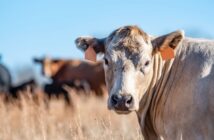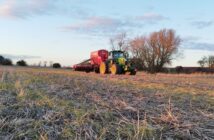Whether dry spells or flooding – farming must be able to cope with the effects of climate change says Paul Temple chairman of AHDB Cereals and Oilseeds
One of the biggest problem the weather has created for many arable farmers is the inability to literally do anything that feels either useful or mitigates the weather. It has become a painful spectator sport, like watching a team you’re passionate about, not look in great shape and play like idiots and there is nothing you can do about it!
With so much winter wheat unsown going into 2020, stoic optimism has eroded into either mild desperation or a reluctant acceptance that it’s just not going to get sown. Add in the uncertainty of less attractive spring sowing options, resulting forward budgets and uncertain new marketing circumstances in 2021 and it becomes a real management challenge.
So I can fully understand the genuine need to ‘do something’, however against some of the weather forecasts, doing nothing remained the more sensible option. It is difficult, but when the surrounding trade questions the wisdom of some of the land work, application of agro-chemicals and fertilisers carried out by farmers, we have to take note. These actions in late winter and on very wet soils have the most immediate effects, which the farmer can find difficult to appreciate but come with real consequences for water contamination.
The Voluntary Initiative (VI) has rightfully played a greater interest in water issues as they are one of the areas farming can be immediately judged on. The VI will continue to drive key messages into the industry to ensure farming is fully aware of water issues and the important role land managers and operators play in protecting water. With ever more sensitive equipment, tighter rules and greater demand on the water companies, it has been a great measure of success that their emphasis has moved to working with farmers in key catchment areas
There are a growing number of great examples of co-operation and initiatives tailored to individual catchments from companies across the UK. This process is working through local catchment managers working with farmers together. I have seen for myself that when a local problem is put in front of farmers they want to find solutions. The concept, when explained in a practical way that the expensive product they bought simply needs to remain in the field is usually fully appreciated.
If anyone is given the opportunity to visit a water treatment plant it is worth taking the time to see at first hand the processes water has to go through from abstraction, to being of the right quality to enter the mains delivery system. The engagement is a hugely beneficial two way process as problems lie on either side and catchment managers are always looking for farming experience that will provide solutions.
Looking back at a meetings notes in September it is difficult to imagine the serious concerns about consistent falling levels of water that were being discussed. If Climate Change is to bring extremes of either dry or wet weather we have to have the ability to cope with either. In leaving the CAP it should provide a greater degree of flexibility to design into farming, support and incentivise the means to mitigate and protect the environment which farming operates in. The recent horrific flooding has demonstrated the catastrophic effect on not only farming but the natural environment it has, literally nothing survives and soil becomes lifeless.
So opportunity does allow us to forward think and regionally tailor solutions in the way we manage water. It would be great to see the NGO’s appreciate the practical challenge farmers and water companies have in this area and join in the discussion rather than shout from the side-lines. The new ELM’s must be capable of satisfying all interested parties and offer sufficient financial incentive to see them taken up enthusiastically only that way will they be done well.
Next time you turn a tap on stop and think what role you play and how farming can do things in a better way. We are capable of being a good news story and showing society we are part of the solution in a very uncertain climate.




